
Delivery of Emergency Supplies Supports Flood Response in Kenya: IOM and UPS Foundation Partnership

UPS trucks depart from Nairobi on their way to deliver relief kits to families affected by floods. Photo: IOM Kenya, 2024.
Heavy rains in early and mid 2024 in Kenya resulted in devastating floods that displaced more than 400,000 people, washing away homes and livelihoods. Major infrastructure including roads and bridges were also severely damaged. Nearly 5,000 livestock deaths were reported, and close to 30,000 acres of farmland destroyed. Many of the affected families had just come through droughts; the floods were yet another weather-related disaster testing their resilience and survival.
“Water levels have never been this high. Now we have no houses, no toilets, and no food. Important legal documents, such as our identification cards, title deeds and academic certificates have all been washed away,” said Mohamud Omar, Community Leader and Chairman of Bula Kamor Area, Garissa, one of the communities worst affected by floods that devastated several areas of Kenya.

“The recent floods swept away my crops, livestock, and uprooted my home,” said John Olang, a small-scale farmer from Homa Bay County, standing in his recently re-planted field. Photo: IOM/Moses Otunga, 2024.
Preparation for relief kit distributions
Following needs assessments and coordination with national and county government authorities, heavily affected areas were identified for urgent humanitarian response. In addition to central Kenya, these included the counties of Mandera and Garissa in the eastern region; Kilifi and Tana River on the coastal region, and Homa Bay in the far western region.
In line with wider response plans, as part of comprehensive recovery support efforts, the International Organization for Migration (IOM) in Kenya prepared thousands of non-food item kits for distribution. The relief kits included items tailored for flood response: tarpaulins to support emergency shelters, bar soaps, kitchen sets, mosquito nets, solar lamps, buckets, jerry cans, sleeping mats, blankets, and ‘lessos’ – swathes of patterned fabric.
USA for IOM, IOM’s non-profit partner in the United States, accepted the offer of in-kind transportation and logistics support from the UPS Foundation to deliver emergency supplies to thousands of families affected by flooding in Kenya.
Counties of distribution of IOM relief kits delivered by UPS Foundation in response to 2024 floods in Kenya.>

Logistical challenges
With more than 3.8 metric tons of relief supplies in the capital of Nairobi due for distribution, logistics would be daunting, with destinations between 400 km and 900 km away, across flood-affected areas, where severe damage to roads and bridges affected traffic routes. The distance between the distribution sites in some counties were also far apart and designating a central point for the beneficiaries was a challenge.
Through the UPS Foundation donation and their partner G4S, 17 trucks traversed more than 3,000 kilometers in total, reaching five counties. The distributions delivered relief kits to 4,200 families, for a total of 25,201 lives impacted (12,348 male and 12,853 female). The distributions were carried out in collaboration with implementing partners Kenya Red Cross and World Vision Kenya.
Overall, IOM Kenya’s flood response in 2024 in collaboration with partners reached 100,000 individuals. Distributions were carried out in coordination with local authorities, to support the most affected households. These included women headed households, and those who had lost their livelihoods.
“It was raining heavily; the rain and flood soaked our beds. We are afraid for our children, we have nowhere to take them. It rained again yesterday. We have no place to put our belongings, so we sleep on wet ground. I am grateful today for this distribution. Thank you, it was sincerely needed,” said Nadia, a mother from Tana River.

Distribution of relief kits to individuals heavily affected by the floods in Homa Bay, Kenya. Photo: IOM/ Moses Otunga, 2024.
Collaborative efforts
The UPS Foundation joined IOM in Nairobi for the departure of several trucks.
“We flagged off the trucks, heading to Tana River; other trucks will soon go to other counties, in partnership with IOM, to deliver relief items to those who are affected by the floods. Now while the floods have left the headlines, sometimes we forget that the people who have been affected are still experiencing the same impact on their lives,” said Caroline Kiunga, Global Humanitarian Relief Director, UPS Foundation.
“Today we are dispatching another round of shipments to flood affected families. We are delighted to partner with the UPS Foundation in IOM’s response to the ongoing floods in Kenya,” said Sharif Faisal, Head of Programs at IOM Kenya. “This partnership with the UPS Foundation is part of our approach to increase partnership with all stakeholders, including the private sector.”

IOM Kenya and the UPS Foundation flag off trucks for the delivery of relief kits to flood-affected communities. Photo: IOM Kenya, 2024.
“The devastating floods in Kenya remind us of the urgent need for swift, coordinated action to support affected families. USA for IOM is honored to partner with the UPS Foundation in this critical humanitarian response, leveraging their logistical expertise to ensure that essential relief supplies reach communities in need,” said Luciano Arroio, CEO a.i. of USA for IOM. “This collaboration embodies the power of partnerships in addressing the complex challenges posed by climate-related disaster.”
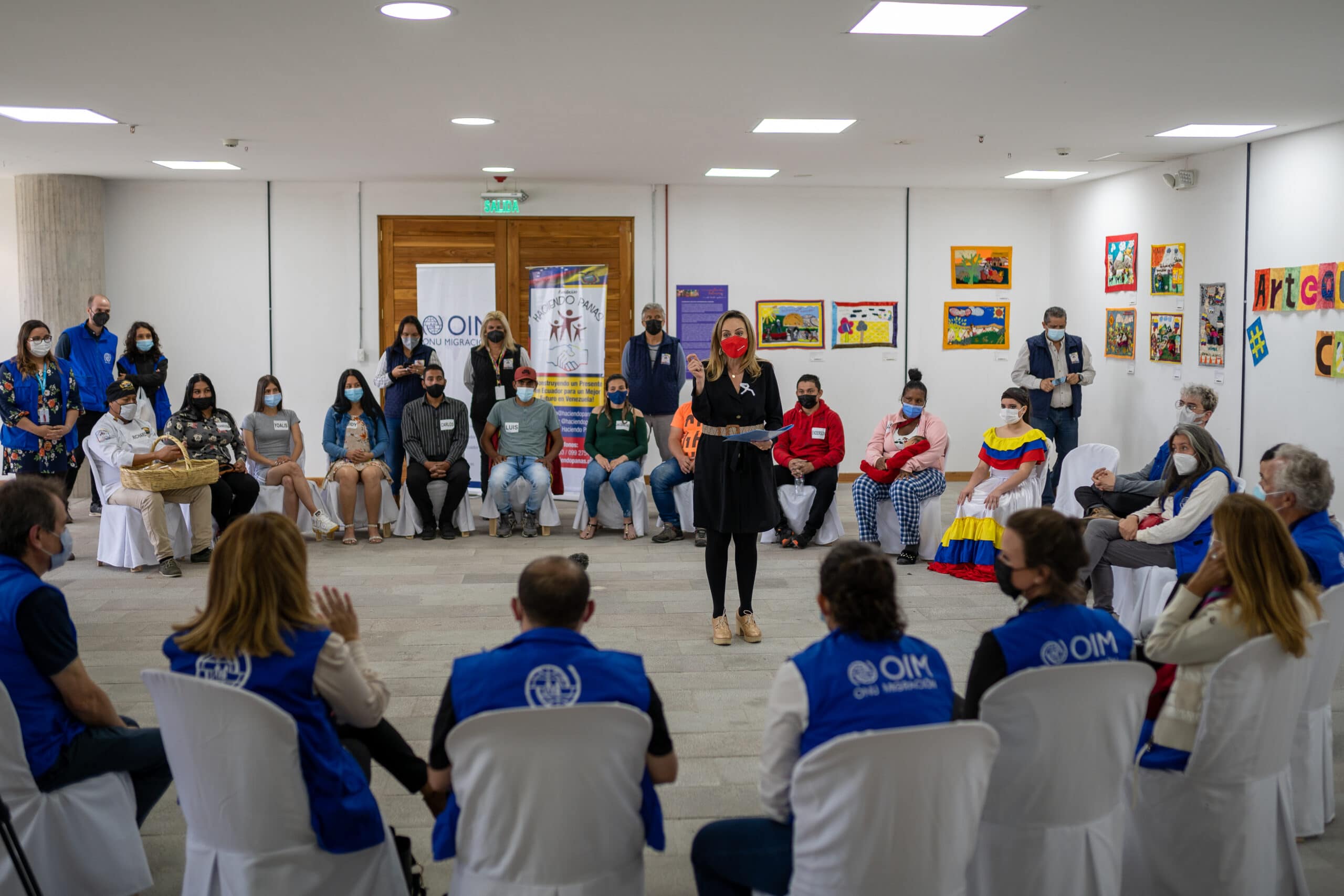
- admin
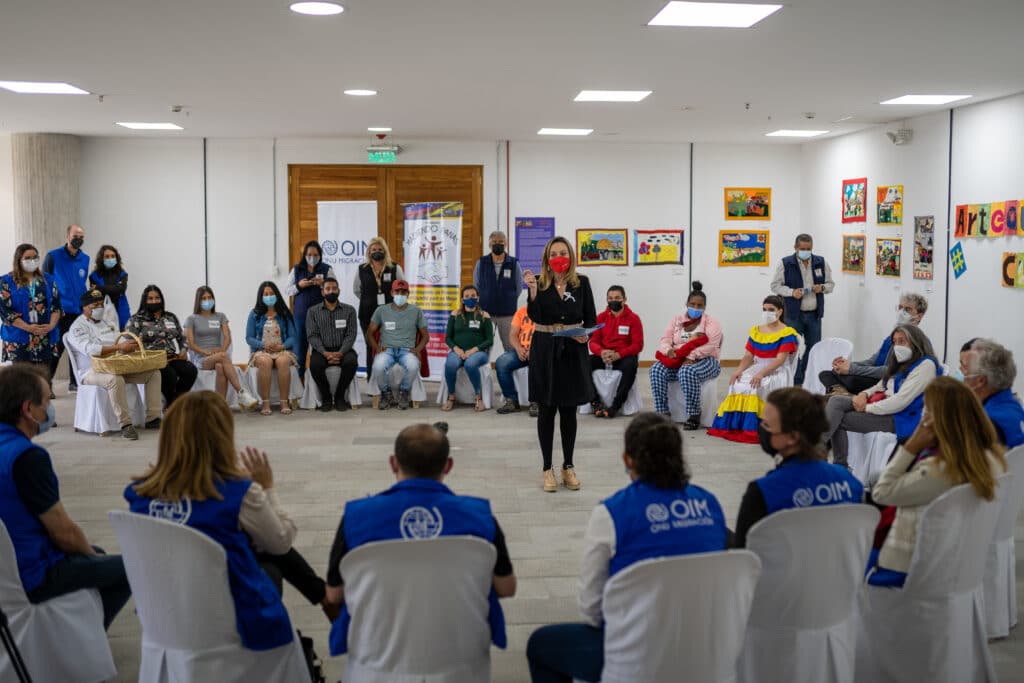
USA for IOM Launches Entrepreneurship in Movement at Summit of the Americas
Los Angeles – USA for IOM (International Organization for Migration) launched Entrepreneurship in Movement today, an innovative program aimed at expanding sustainable livelihoods and positive connections for migrants and refugees and their host communities across the Americas. The program builds on a collaboration between USA for IOM and the Citi Foundation that began in 2019 and aims to help refugees and migrants from Venezuela rebuild their lives with dignity and is currently being implemented in Ecuador and Peru, with the goal of expanding to countries in the Americas.
“Entrepreneurship should be part of the long-term solutions needed to address the consequences of large movements of displaced persons, in addition to the important measures that are put in place to cope with the immediate effects of humanitarian crises,” IOM Director General António Vitorino said during the program’s launch event on the margins of the Summit of the Americas.
The socioeconomic integration of migrants is integral to building a sustainable, resilient, and equitable future is the theme of this year’s Summit.
The Americas are witnessing the largest refugee and migrant movements in the region’s recent history. According to R4V, more than six million refugees and migrants from Venezuela have left their country of origin, with more than five million being hosted in the region. Many Venezuelans possess the skills to contribute to the local economy but struggle with access to employment. Entrepreneurship in Movement creates that access by providing training, social mentorship and coaching to help migrants create sustainable livelihoods through their businesses.
In addition, the Citi Foundation enables migrant entrepreneurs to access seed capital critical to turning their vision into reality. In Ecuador and Peru combined, nearly 700 migrant entrepreneurs have been trained, with more than 500 receiving seed capital for their businesses.
“For the past three years, the Citi Foundation has proudly supported the work of USA for IOM to empower vulnerable migrants and refugees through critical job training, education and entrepreneurship opportunities,” said Florencia Spangaro, Chief Operating Officer at the Citi Foundation. “Programs like Entrepreneurship in Movement help scale entrepreneurship training within the communities that need it most, and we look forward to seeing how it will support migrants and their families in achieving financial stability.”
Entrepreneurship in Movement also strengthens the local economy by launching new businesses in their host community, fostering job creation and social cohesion to fight against xenophobia and promote the shared value of diversity.

- Stacey Cohan
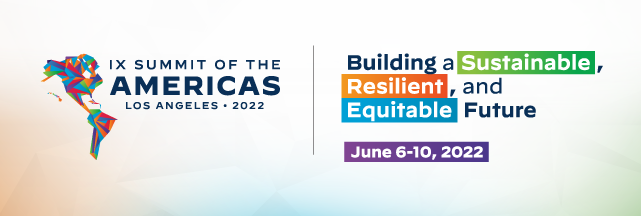
Empowering young entrepreneurs at Summit of the Americas
The 9 th Summit of the Americas begins June 6 th in Los Angeles, California. The focus is
“Building a Sustainable, Resilient an Equitable Future.” As world leaders work to build a
better future, we must engage the generation hoping to flourish in the future we are
trying to build.
Young people add their voices to the Summit of the Americas in the Sixth Youth
Americas Forum. USA for IOM CEO Maria Moreno engages with this critical audience
as the moderator of a panel focused on Supporting the Integration of Migrants in the
Americas on June 7 th . The purpose is to engage stakeholders across multiple sectors to support livelihoods, advance local development and create social cohesion between
migrants and host communities.
USA for IOM also plans to elevate our work as part of IOM’s Venezuelan response with
news about our Entrepreneurship in Movement program. The ongoing project, in
cooperation with Citi Foundation, works to assist Venezuelan migrants starting new
lives and new businesses in host communities. Maria Moreno explains, “We celebrate
the opportunity to highlight our “Entrepreneurship in Movement Program – EiM” as it
enters a third year. Investments like these are both aligned with the aims of this year’s
Summit and are key to promoting economic resilience and inclusive, peaceful, thriving
societies for all.”
The program mirrors the goals of this year’s Summit, striving to build a sustainable,
resilient, and equitable future for migrants and refugees. The VI Young Americas Forum is hosted and managed by the Young Americas Business Trust in partnership with the Organization of America States.

- Stacey Cohan
International Day of UN Peacekeepers: People. Peace. Progress. The Power of Partnerships
Each year on May 29th the United Nations honors UN Peacekeepers. This year, the UN marks the occasion under the theme “People Peace Progress: The Power of Partnerships.” USA for IOM honors those partnerships in highlighting the IOM Kenya’s peace building programs in Mombasa.

In March, USA for IOM visited the Kadzandani ICT Hub in a Mombasa sub-county. IOM began supporting the center in 2021 through the “contributing to sustainable peace” program. The goal is simple: give young people options and opportunities to prevent them from joining drug gangs or extremist groups. Through a partnership with Family Health Options Kenya, young people are taught life skills as they are mentored for the job market. Artistic talents flourish with audio/visual training and performances. The center is a safe space and has connected youth and parents with a path away from the false promise of easy money from gang recruiters.
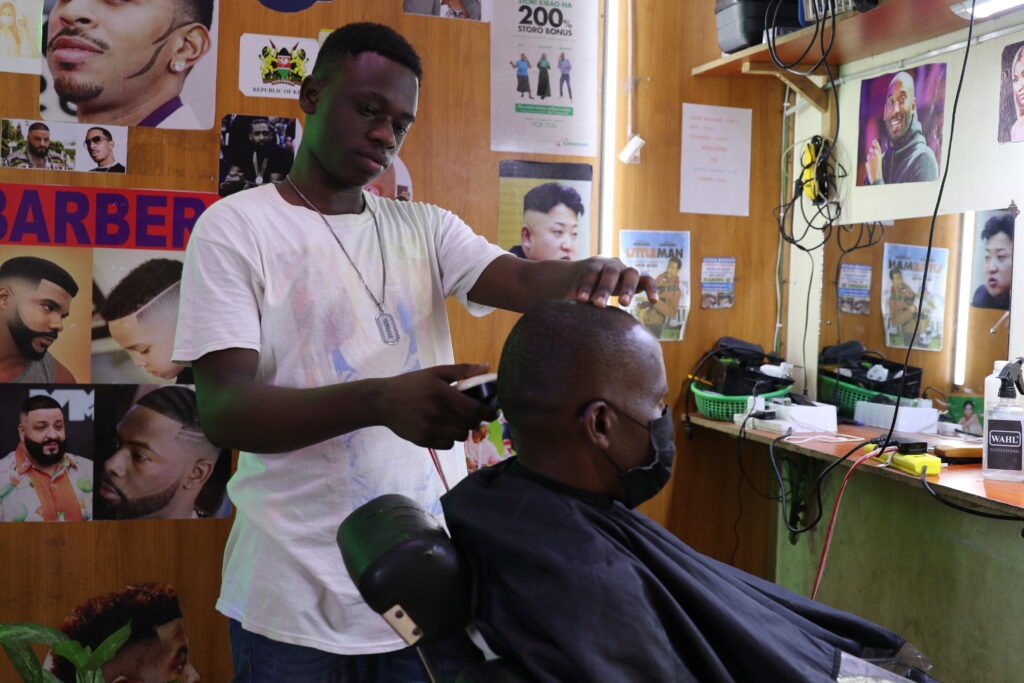
In a more urban part of Mombasa, IOM established the Majengo Yourh Resource Center in 2016 with the support of the German government, The Kenyan Government considers Majengo a hot spot for youth radicalization and recruitment by the violent extremist group Al-Shabaab. Local youth are trained in beauty, tailoring and computer skills. It is a fully operational center providing real services to the community while giving young people work experience and options for their future. The result is fewer young people joining gangs.
This May 29th, USA for IOM celebrates the power of collaboration between civil society organizations, local government, clergy, grassroots initiatives, and IOM. Today, we thank all those who work with us in the pursuit of peace.
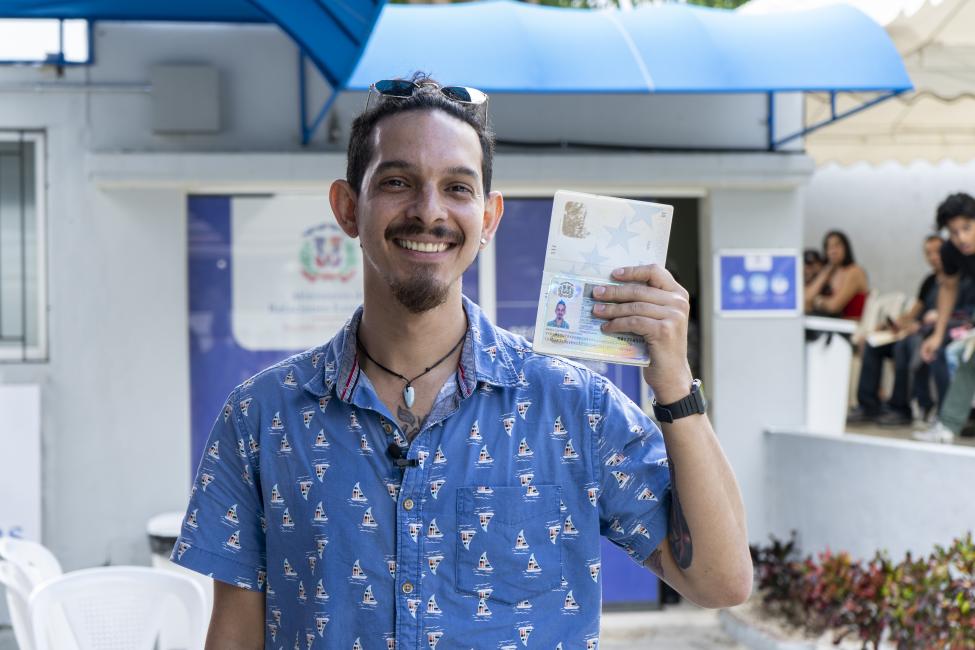

- admin
Nearly 40% of Venezuelans in the Dominican Republic are one step closer to gaining regular status.
The partners of the Interagency Coordination Platform for Refugees and Migrants from Venezuela (R4V) in the Dominican Republic salute the national government for the achievements made during the first year of implementation of the Normalization Plan for Venezuelans (PNV), which seeks to guarantee access to the regularization of Venezuelans living in the country.
To date, more than 40,000 Venezuelans have registered with the PNV and 17,000 have already received their visas (the majority as temporary workers) and thousands of others continue to go through some of the three phases of the plan.
Dominican Republic is the first recipient country of the Venezuelan population in the Caribbean and the eighth in Latin America. Of the more than 5 million people who left Venezuela for neighboring countries in the region, nearly 116,000 chose to seek safety and new opportunities in the Dominican Republic.
Since the start of the PNV in April 2021, the R4V National Platform in the country, co-led by the International Organization for Migration (IOM) and the United Nations High Commissioner for Refugees (UNHCR), in coordination with 15 partner organizations , has accompanied and supported the efforts of the Dominican government to facilitate the access of the Venezuelan population to regular stay, which will translate into better access to basic rights such as health, job opportunities in the formal market and education.
To facilitate the implementation of the PNV, an alliance has been consolidated with eight community organizations of Venezuelans in various cities of the country, which operate the Free Orientation Windows (Ventanillas de Orientación Gratuita), in which information and orientation about the process is provided, and where information is received. documentation of those who apply to the PNV.
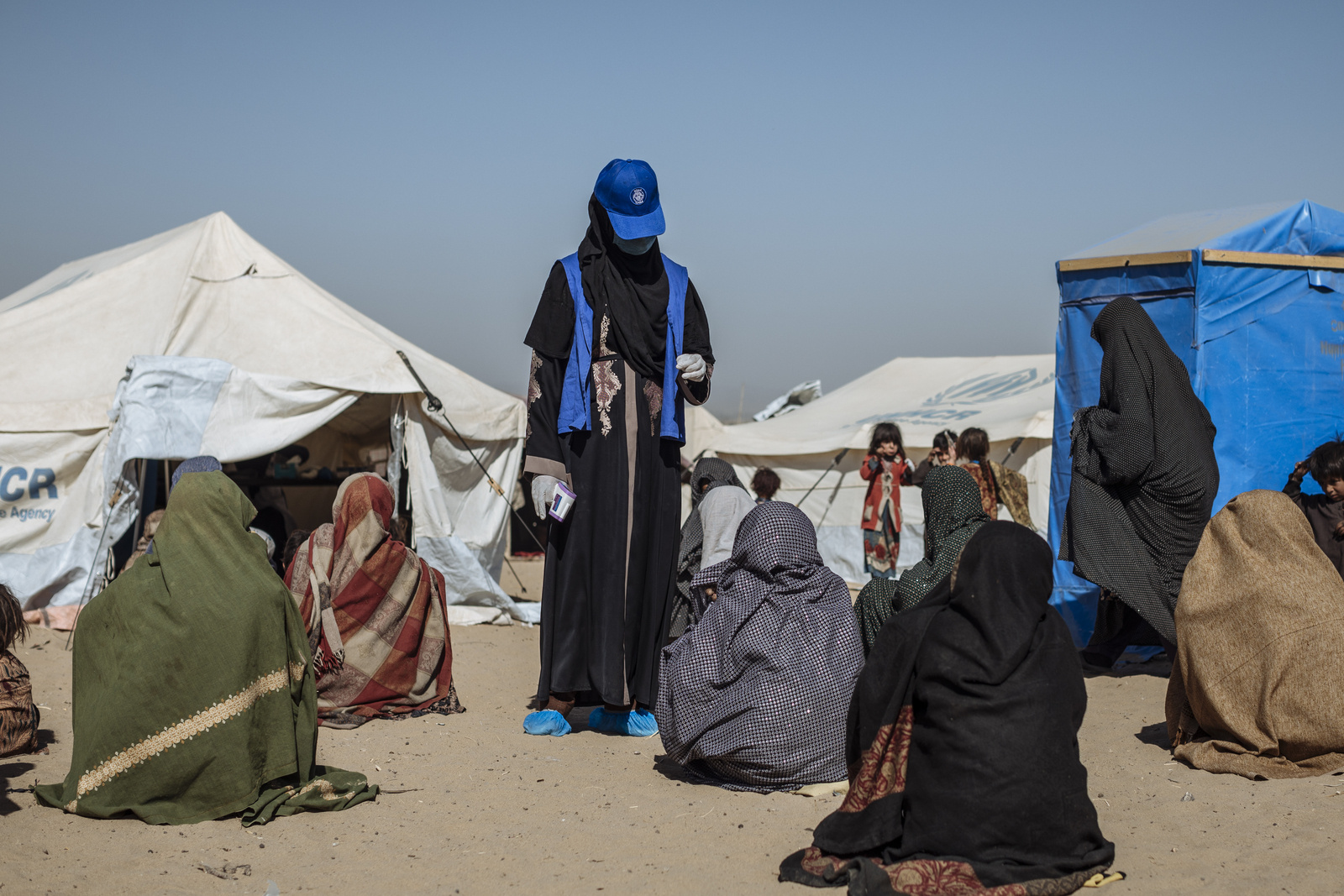
IOM in Afghanistan: Leave no one behind
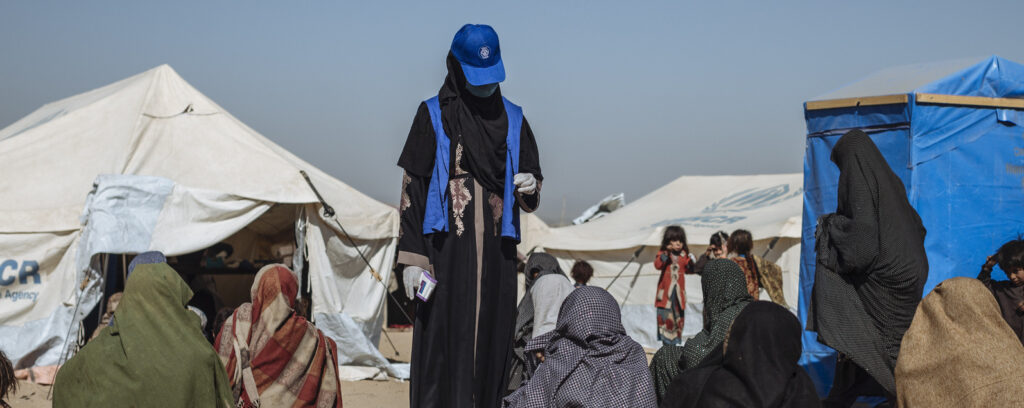
- admin
Miriam is one of the over 5.5 million internally displaced in Afghanistan; she lost three sons in the recent conflict and has not heard from her remaining living son since he left home to seek a job abroad two months ago. “Being so uncertain about his fate and whereabouts is painful,” Miriam told an IOM worker with tears streaming down her face. Miriam, and many others like her, are dependent on IOM’s Humanitarian Assistance Programme.
IOM’s operations in Afghanistan continue across multiple provinces since the heart-wrenching events of August witnessed worldwide in the news and on social media. More than 630,000 individuals have been newly displaced by conflict this year; almost half of whom left their homes since July and an additional 28,000 have been displaced by disasters.
IOM has maintained a consistent presence in Afghanistan since 1992 through conflict, humanitarian crises, and natural disaster, and we remain committed to supporting the Afghan people, men, women, and children alike, with their immediate humanitarian needs as the first concern. IOM has launched an urgent appeal for USD 24 million to scale up its response to the most pressing, life-saving needs. At this stage, IOM is providing emergency shelter and core relief items to Afghans who have been displaced from their home jointly with the World Food Programme allowing families to receive essential food and non-food items together.
IOM also delivers development and community stabilization programming to support people on the move across Afghanistan. This includes health services, including primary healthcare, reproductive healthcare, COVID-19 response, and mental health support; protection case management and monitoring; support to small businesses; disaster risk reduction; and holistic community development interventions supporting stabilized communities and bolstered resilience.
IOM refuses to abandon the people of Afghanistan, and we are thankful we are not alone in our commitment. As the events in August unfold with scenes of despair and desperation, the US public showed concern, care, and support.
Last year, 2020, marked a record high for US private sector and philanthropic individuals’ charitable contributions. The resilience and responsiveness of the American people to increased and widespread needs throughout the ongoing COVID-19 pandemic is encouraging and inspiring. As the need persists, we are confident the response of the US public will as well.
If you are interested in supporting the meaningful, crucial work of IOM in Afghanistan, please contribute HERE.
